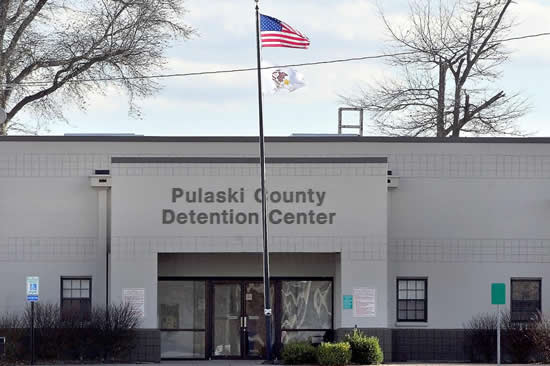As of April 9, three individuals at the Pulaski County Detention Center have tested positive for COVID-19 and Illinois activists are advocating for the compassionate release of detainees from the center.
The Southern Illinois Immigrant Rights Project has joined other activist groups across the nation to demand the compassionate release of vulnerable immigration detainees.
“We have been making calls, circulating petitions and writing to officials because of concerns among the crowded conditions in detention centers and jails and we have been asking for people to be released so that they can shelter at home or in appropriate community settings,” Becca Tally, chair of the Southern Illinois Immigrant Rights Project, said.
Tally said in these types of facilities, people are held together in close quarters and are not able to practice the social distancing protocols. She said she has been hearing from individuals at the detention center that there is often a lack of masks or protective equipment.
“It may be difficult to wash hands and things like that as much as possible so when something is introduced, it’s very hard to prevent people from being infected by that,” Tally said. “Especially with what we know about COVID that people who even may not appear sick may be spreading the illness.”
Tally said it is vitally urgent that people are released from the center, especially those who are older or who have underlying medical conditions.
“Some of the people who have been detained have been made aware of the news, they’ve heard the news that there were confirmed cases there and they’re very frightened and asking for any help available before they are put in more danger, so the situation is really urgent,” Tally said.
Tally said the majority of those at the detention center have not been convicted of a crime, or if they have, it is at the lowest level of severity, like a civil offense. She said there are people in detention centers across the nation who are seeking asylum but can’t afford the bond to be released from custody.
“This has really been a matter of resource inequality that is keeping people in these dangerous situations,” Tally said.
The ACLU of Illinois is moving towards filing a lawsuit regarding vulnerable detainees throughout the state, according to spokesperson Ed Yohnka. Other law firms across the nation have started filing lawsuits demanding the release of vulnerable prisoners and detainees.
The National Immigrant Justice Center filed a lawsuit against the Jerome Combs Detention Center in Kankakee, Illinois, to request the release of three vulnerable detainees and they were released as a result, according to a release.
“We believe that people who should not be in detention should be released safely and in accordance with public health guidelines,” Yohnka said.
Yohnka said the ACLU of Illinois is actively moving towards filing some actions at the various facilities around the state where people are detained.
“We are talking to clients that are somewhat complicated, we are talking to people in our national office, we are talking to our friends in NIJC and elsewhere but we are actively moving in that direction,” Yohnka said.
Yohnka said in order to bend the curve, COVID-19 outbreaks will have to be controlled everywhere, including detention centers and jails.
“One of the things that we’re seeing is, whether it’s Cook County Jail or Pulaski County Jail, that when these outbreaks happen in these facilities where social distancing is impossible, where conditions are often not sanitary, that you just kind of have this rampant outbreak before you know it,” Yohnka said. “That’s what we’re really trying to address with these sorts of releases.”
Cindy Buys, Interim Dean of SIU’s Law School, said less than half of the people who are deported from the country have any criminal record and releasing them would not pose a danger to the public.
“When congress enacted the immigration statute, it provided that a violation of some of the provisions, or most of the provisions of the immigration stature are not criminal offenses,” Buys said. “There are no criminal penalties; you don’t go into criminal court if you violate the statute.”
Buys said a large portion of those who are in the country without permission right now came to the U.S. lawfully but overstayed their visas. She said there is no criminal penalty for doing this and that it is classified as a civil violation.
Buys said compassionate release would be possible and that immigration law has a provision called “humanitarian parole,” which allows the executive branch to parole someone into the country.
“You could use this parole to say that a person is allowed to go and live with their family during the pandemic, to help with the social distancing and to help decrease the spread of the disease,” Buys said. “It would be done on a humanitarian ground for humanitarian reasons but the executive branch really has a lot of discretion to do that and how they do that.”
Buys has been to the Pulaski County facility before and is in charge of SIU’s Immigration Detention Center Project.
(See more: SIU law students aid detainees at Souther Illinois Detention Center).
“The Pulaski County facility has a little over 200 beds total in the facility and the vast majority of those beds, somewhere between 150-200 beds are normally occupied by immigration detainees,” Buys said.



